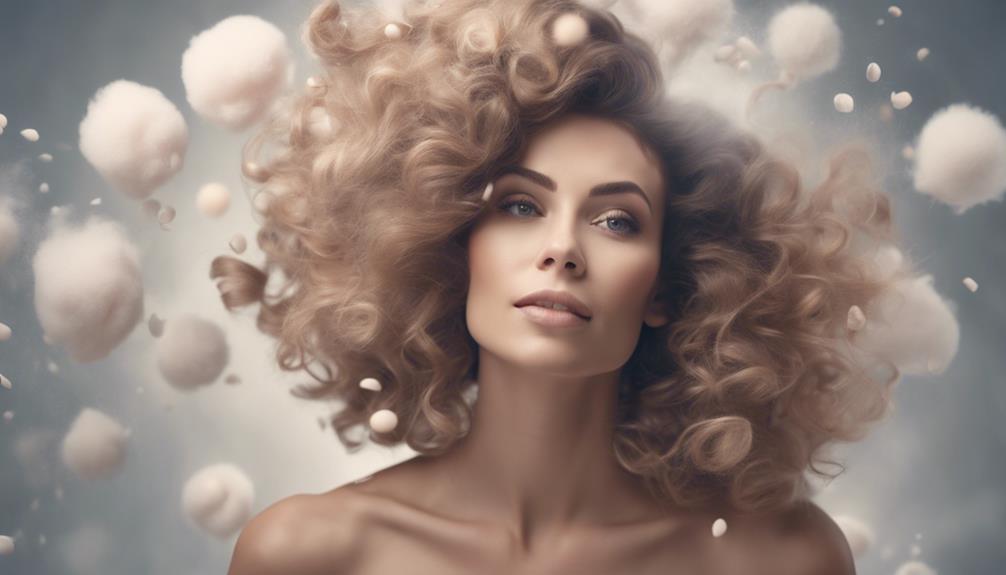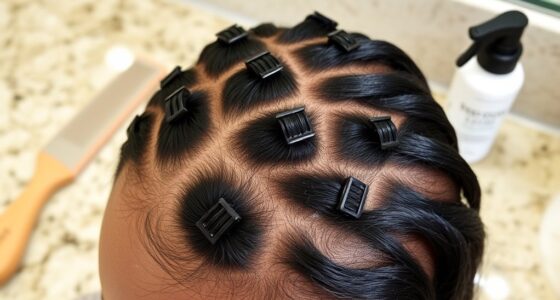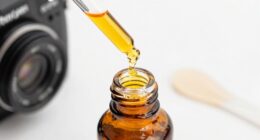To care for your scalp like skin, you need to balance its microbiome, manage sebum production, and protect it from environmental stressors. Gentle cleansing preserves natural oils and supports healthy microbes, while routine massages boost circulation and regulate oil flow. When you treat your scalp with the same care as skin, you promote stronger, more vibrant hair. Want to discover how advanced formulas and routines can optimize this skinification process? Keep exploring for more insights.
Key Takeaways
- Scalp skinification emphasizes gentle cleansing, hydration, and protection to maintain healthy skin-like scalp conditions.
- Supporting the scalp’s microbiome balance prevents irritation, dandruff, and promotes overall scalp health.
- Regulating sebum production ensures a moisturized, non-greasy scalp, mirroring skin’s natural oil balance.
- Using skin-friendly ingredients and avoiding harsh surfactants preserves the scalp’s natural barrier and microbial harmony.
- Regular scalp care routines that include massage and tailored cleansing foster resilient, vibrant hair growth.

Understanding the science behind scalp care is essential for maintaining healthy hair and preventing issues like dandruff, excess oil, and irritation. Your scalp isn’t just a foundation for hair; it’s a living ecosystem where balance is key. One of the most critical aspects of this balance is maintaining a healthy microbiome balance. Your scalp hosts a diverse community of microorganisms—bacteria, fungi, and other microbes—that work together to protect against harmful pathogens. When this microbiome is disrupted, it can lead to inflammation, dandruff, and discomfort. Proper scalp care supports the natural harmony of these microorganisms, helping to prevent overgrowths of yeast or bacteria that cause irritation.
A healthy scalp microbiome is essential for balanced, irritation-free hair.
Another vital factor is sebum regulation. Sebum is your scalp’s natural oil, produced by sebaceous glands, and it plays a crucial role in keeping your scalp moisturized and protected. However, too much sebum can clog hair follicles, leading to greasy roots and potentially promoting dandruff. Conversely, insufficient sebum can leave your scalp dry, flaky, and prone to irritation. Achieving the right sebum regulation means balancing oil production without stripping your scalp’s natural defenses. Using the right hair care products—gentle cleansers that clean without over-drying—can help maintain this equilibrium.
Thinking of your scalp as skin similar to the skin on your face can be helpful. Just like facial skin, your scalp benefits from gentle cleansing, moisturizing, and protecting against environmental stressors. When you choose shampoos and treatments, look for formulations that support microbiome balance by avoiding harsh surfactants and preservatives that can kill beneficial microbes. Incorporating ingredients like prebiotics or probiotics into your routine can nurture your scalp’s microbiome, encouraging a healthy environment for hair growth.
Moreover, managing sebum levels involves more than just the products you use; it also includes your lifestyle habits. Regular scalp massages can stimulate circulation and help regulate oil production. Avoiding excessive washing or overwashing is key—washing too often strips natural oils, prompting your scalp to produce even more sebum to compensate. Conversely, infrequent washing allows sebum to accumulate excessively, leading to greasiness and potential breakouts. Finding a routine that suits your scalp type, whether oily, dry, or sensitive, is fundamental to maintaining that delicate balance.
In addition, ongoing AI research is contributing to a deeper understanding of scalp health and personalized treatment options, paving the way for innovative solutions tailored to individual needs. In short, understanding and supporting your scalp’s microbiome balance and sebum regulation are foundational steps toward healthier hair. When your scalp’s ecosystem is in harmony, you’re more likely to enjoy a comfortable, irritation-free scalp that fosters strong, vibrant hair. Proper care isn’t just about appearance; it’s about respecting and nurturing your scalp’s natural biology for optimal hair health.
Frequently Asked Questions
How Does Diet Influence Scalp Health?
Your diet directly impacts your scalp health by providing essential nutrients for skin and hair. A nutritional balance guarantees your scalp stays hydrated and resilient, reducing issues like dryness and dandruff. Incorporating dietary supplements can support hair strength and scalp vigor. When you eat well and consider supplements, you promote a healthy scalp environment, which leads to healthier hair growth and less irritation over time.
Can Scalp Care Improve Hair Growth Speed?
Yes, proper scalp care can improve hair growth speed. When you keep your scalp well-hydrated and maintain the right scalp pH balance, you create an ideal environment for hair follicles to thrive. Regular gentle cleansing, moisturizing, and using products that support pH balance help prevent dryness and irritation. These practices promote healthier, faster-growing hair by ensuring your scalp stays balanced, hydrated, and free from buildup.
Are There Natural Remedies for Scalp Inflammation?
Imagine you’re back in ancient times, using herbal remedies to soothe your scalp. Yes, natural remedies like aloe vera, tea tree oil, and chamomile can reduce scalp inflammation. Essential oils such as peppermint or lavender offer anti-inflammatory benefits and promote healing. Always dilute essential oils and do a patch test first. These natural options can calm irritation, balance your scalp, and support healthier hair growth without harsh chemicals.
How Often Should I Exfoliate My Scalp?
You should exfoliate your scalp once a week to promote scalp renewal and prevent buildup. Over-exfoliating can cause irritation, so stick to this frequency unless your scalp is particularly oily or prone to flakiness. Use a gentle scalp scrub or a product formulated for scalp exfoliation to keep your scalp healthy, clear, and ready for ideal hair growth. Pay attention to your scalp’s response and adjust accordingly.
What Are Early Signs of Scalp Skin Issues?
You might notice early scalp skin issues if your scalp feels itchy, flaky, or irritated, and if there’s redness or a dull appearance. Changes in scalp pH can disrupt your microbial balance, leading to these issues. Keep an eye on excessive oiliness or dryness, as these signs indicate your scalp’s health is off-balance. Addressing these early symptoms helps maintain a healthy scalp and prevents more serious problems later on.
Conclusion
As you nurture your scalp, you’re tending to the hidden garden of your hair’s health. When you embrace the science of skinification, your scalp becomes a fertile ground for vibrant, resilient strands to flourish. Think of your scalp as the roots of a mighty tree—strong and healthy roots lead to a canopy of glossy, thriving hair. By caring for this foundation, you’re revealing the secret to truly radiant, beautiful hair.









